外研版必修5 Module 5 The Great Sports Personality Grammar课件(38张ppt)
文档属性
| 名称 | 外研版必修5 Module 5 The Great Sports Personality Grammar课件(38张ppt) |  | |
| 格式 | zip | ||
| 文件大小 | 2.8MB | ||
| 资源类型 | 教案 | ||
| 版本资源 | 外研版 | ||
| 科目 | 英语 | ||
| 更新时间 | 2022-02-11 21:20:17 | ||
图片预览



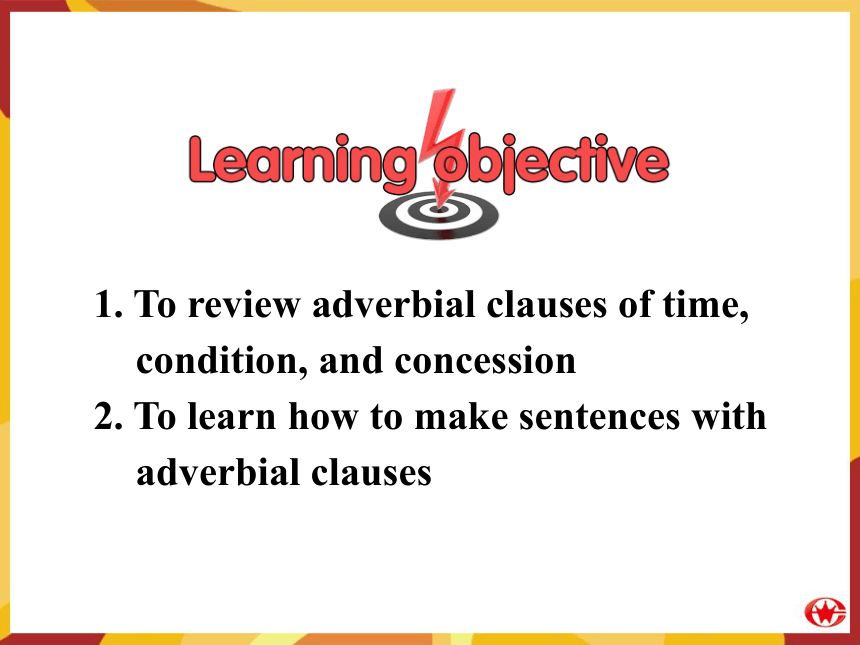


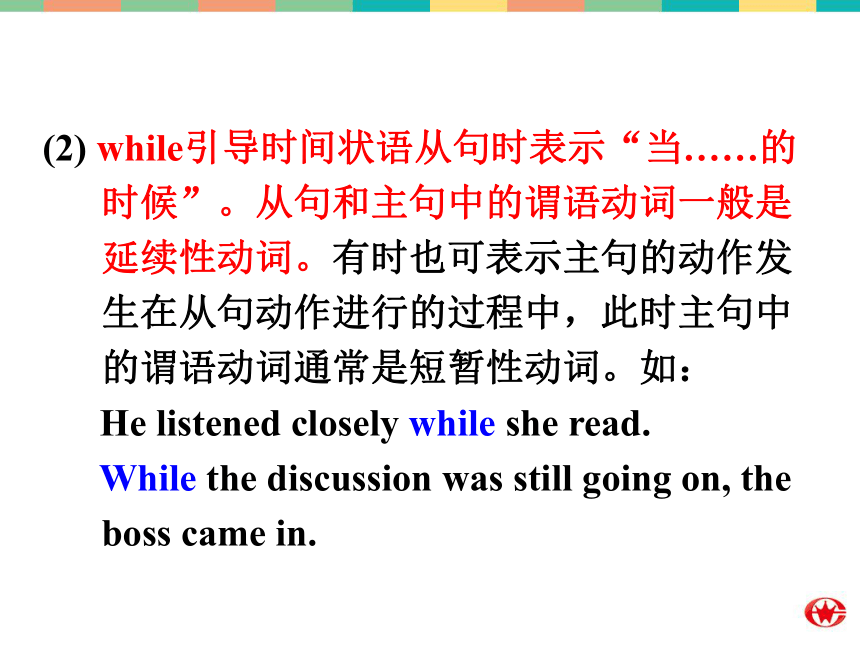
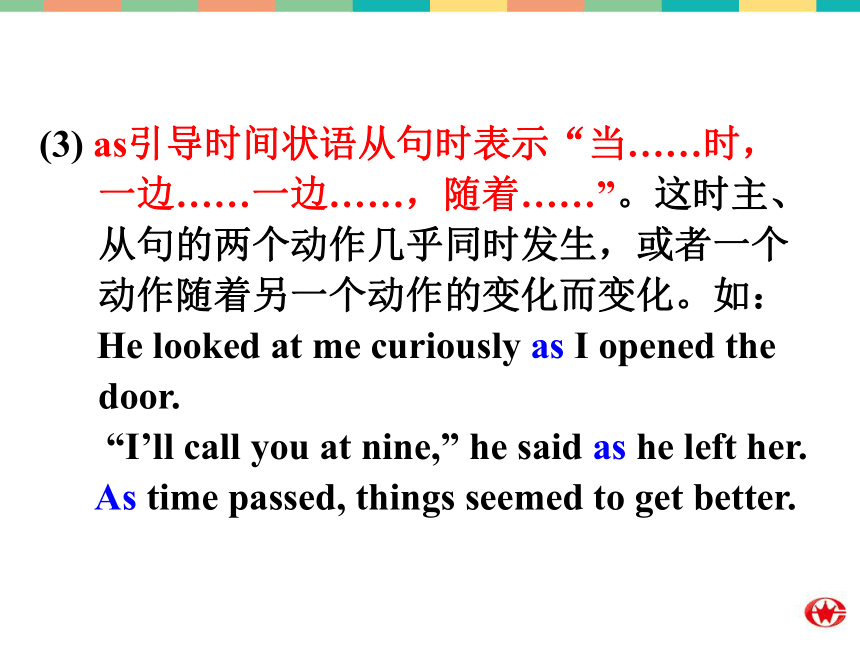
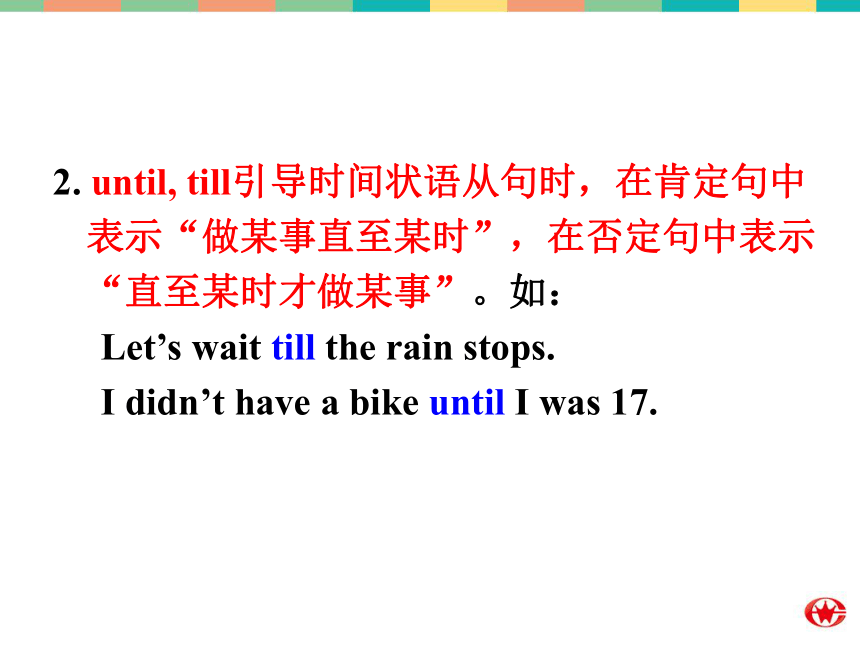
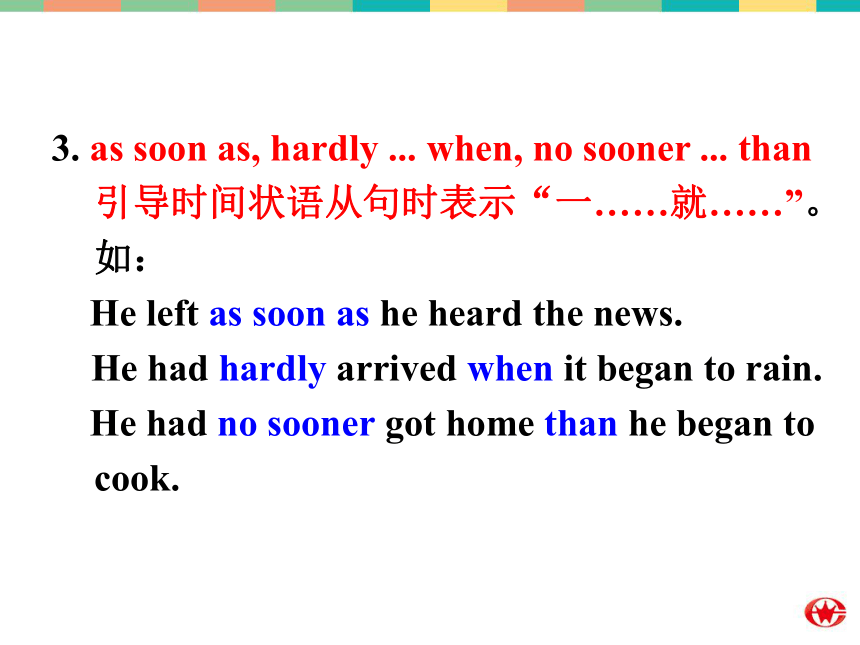
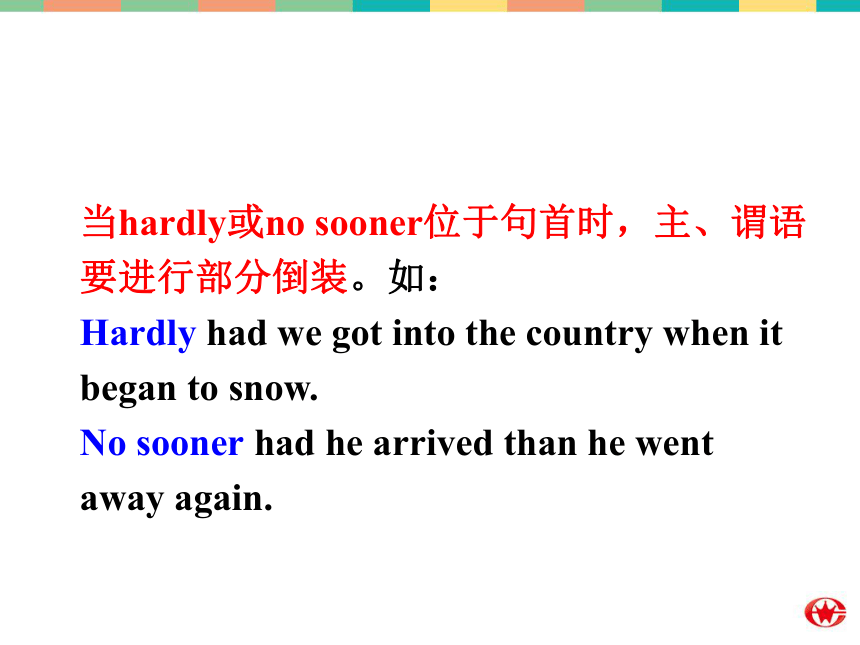
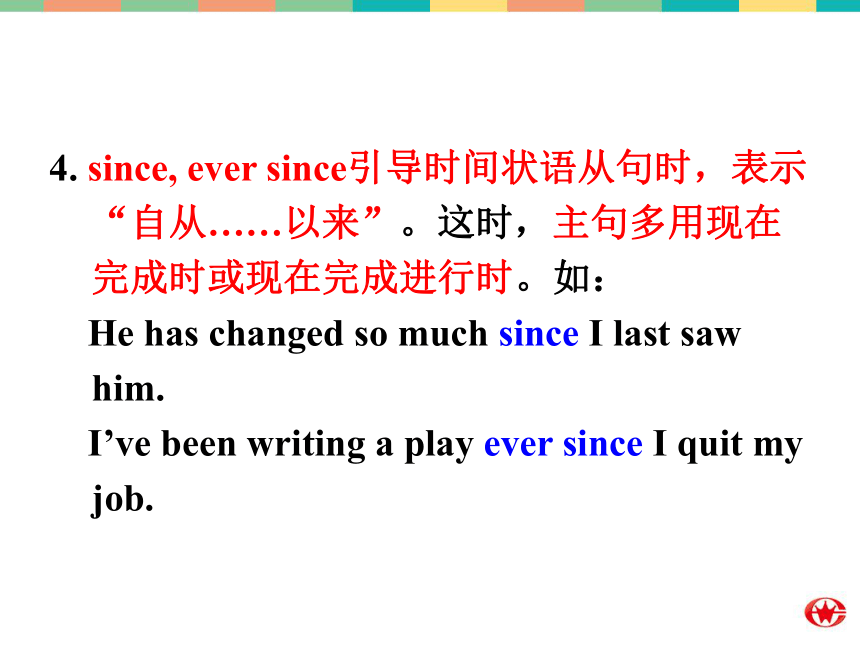
文档简介
(共38张PPT)
Adverbial Clause
1. To review adverbial clauses of time, condition, and concession
2. To learn how to make sentences with adverbial clauses
时间状语从句
1. 由when, while, as引导的时间状语从句
(1) when引导时间状语从句时表示“当……的时候”。从句谓语动词可以是延续性动词也可以是短暂性动词。如:
I studied English when I was young.
When we meet, I will discuss it with you.
when还可以表示突然发生某事,常译为“正在……忽然……”。如:
I was doing my homework when there was a big noise outside.
(2) while引导时间状语从句时表示“当……的时候”。从句和主句中的谓语动词一般是延续性动词。有时也可表示主句的动作发生在从句动作进行的过程中,此时主句中的谓语动词通常是短暂性动词。如:
He listened closely while she read.
While the discussion was still going on, the boss came in.
(3) as引导时间状语从句时表示“当……时,一边……一边……,随着……”。这时主、从句的两个动作几乎同时发生,或者一个动作随着另一个动作的变化而变化。如:
He looked at me curiously as I opened the door.
“I’ll call you at nine,” he said as he left her.
As time passed, things seemed to get better.
2. until, till引导时间状语从句时,在肯定句中表示“做某事直至某时”,在否定句中表示“直至某时才做某事”。如:
Let’s wait till the rain stops.
I didn’t have a bike until I was 17.
3. as soon as, hardly ... when, no sooner ... than引导时间状语从句时表示“一……就……”。如:
He left as soon as he heard the news.
He had hardly arrived when it began to rain.
He had no sooner got home than he began to cook.
当hardly或no sooner位于句首时,主、谓语要进行部分倒装。如:
Hardly had we got into the country when it began to snow.
No sooner had he arrived than he went away again.
4. since, ever since引导时间状语从句时,表示“自从……以来”。这时,主句多用现在完成时或现在完成进行时。如:
He has changed so much since I last saw him.
I’ve been writing a play ever since I quit my job.
5. 引导时间状语从句的词或短语还有:directly, immediately, after, before, the moment, by the time等。如:
The man rushed into the room immediately he heard the noise.
The baby starts crying the moment he sees his mother.
if引导的条件状语从句
可分为两类:
一类是真实条件句;一类是虚拟条件句。
★真实条件句
1. 表示依据其他将来事件,将来有可能发生的事件。如:
I’ll only stay if you offer me money.
We’ll stay at home if it rains.
2. 表示建议或命令某人做某事,及提出请求。如:
I’ll pay you double if you get the work finished by Friday.
If you go out in such a cold day, put on more clothes.
★虚拟条件句
1. 虚拟条件句表示与现在事实相反的假设或现在不可能存在的情况时,条件从句谓语常用动词过去式(be动词的过去式用were),主句谓语用“would / should / could / might +动词原形”。如:
If I were you, I would / should / could / might help him.
If I had the book at hand, I would / should / could / might read the passage to you.
2. 虚拟条件句表示与过去事实相反时,条件从句谓语常用过去完成时,主句谓语常用“would / should / could / might have +过去分词”。如:
If you had worked harder, you would / should / could / might have passed your exams.
3. 虚拟条件句表示与将来事实相反时,条件从句谓语常用动词的过去式(be动词的过去式用were),should +动词原形或were to +动词原形,主句谓语用would / should / could / might +动词原形。如:
If you lived there for a while, you’d change your mind about that place.
If he should / were to come, what should we say to him
让步状语从句
1. though, although, even if, even though引导让步状语从句,表示“即使,虽然,尽管”。though和although引导让步状语从句时,不与but连用,但可与yet, still等连用。如:
Though / Although he is rich, yet he is not happy.
Even if / Even though he is 24, he is still like a child.
2. though, as 引导让步状语从句时,经常将形容词、副词、名词或实义动词提到句首,构成倒装。如:
Young though he is, he is quite clever.
Child as he is, he knows a lot.
Try as you will, you won’t manage it.
3. while引导让步状语从句时,一般位于句首。如:
While I admit that the problems are difficult, I don’t agree that they cannot be solved.
4. “no matter +疑问词”或“疑问词+ ever”也可引导让步状语从句。如:
No matter what may happen, you should keep calm. = Whatever may happen, you should keep calm.
1.(2018 北京卷)_______ we don’t stop
climate change, many animals and plants in
the world will be gone.
2.(2018 江苏卷)_______ you can sleep well,
you will lose the ability to focus, plan and
stay motivated after one or two nights.
If
Unless
3. (2017, 北京)
_______________________ birds use their feathers for flight, some of their feathers are for other purposes.
4. (2017, 北京)If you don’t understand something, you may research, study, and talk to other people _________ you figure it out.
Although/ While/ Though
until/ till
Rewrite the phrases with the prepositions in the box.
Example:
I spoke to a girl who has brown eyes.
I spoke to a girl with brown eyes.
from in on with
a girl _____ a Li Ning tracksuit
in
from in on with
a journalist _____ a national channel
from
from in on with
a child _____ blue eyes
with
from in on with
a young man _____ a bike
on
Rewrite the sentences with prepositional phrases.
Did you see the boy who’s wearing the David Beckham shirt
2. A student who was wearing Nike trainers stood at the door.
Did you see that boy in the David Beckham shirt
A student with Nike trainers stood at the door.
3. I don’t know the girl who’s got long hair and blue eyes.
4. “Look at that boy.” “The one riding the motorbike ”
I don’t know the girl with long hair and blue eyes.
“Look at that boy.” “The one on the motorbike ”
5. A man carrying a baseball bat walked into the room.
6. An official who works at the ministry came to speak to us.
A man with a baseball bat walked into the room.
An official from the ministry came to speak to us.
7. I was stopped by a man wearing a blue suit.
8. That’s my friend who’s a member of the local sports club.
I was stopped by a man in a blue suit.
That’s my friend who’s in the local sports club.
I. 选用方框内合适的内容完成下面句子(每项限用一次)。
as if, now that, immediately, supposing (that), so that, as
1. ________________ it were true, what would happen
2. ________________ dinner is ready, wash your hands.
Supposing (that)
Now that
3. Julie loves the boy so much ___________ she were his mother.
4. Bring it nearer ___________ I may see it better.
5. Young __________ I am, I already know what career I want to follow.
6. ___________ she'd gone, I remembered her name.
as if, now that, immediately, supposing (that), so that, as
as if
so that
as
Immediately
II. 根据括号内的提示翻译下面句子。
1. 他走得很快生怕迟到。 (for fear that)
__________________________________
__________________
2. 他刚到就又被叫走了。 (no sooner ... than)
___________________________________
__________________________
He walked very fast for fear that he should be late.
He had no sooner / No sooner had he arrived than he was asked to leave again.
3. 无论你到哪里,我都会在这里等着你。 (no matter where)
___________________________________
_________________
4. 考虑到他只学了一年,他的英文已讲得相当不错了。 (considering that)
____________________________________
____________________________________
No matter where you go, I will be right here waiting for you.
Considering that he's only been leaning English for a year, he speaks it very well.
1. Complete Exercise 2-4 on page 44-45.
2. Preview the Listening part.
Adverbial Clause
1. To review adverbial clauses of time, condition, and concession
2. To learn how to make sentences with adverbial clauses
时间状语从句
1. 由when, while, as引导的时间状语从句
(1) when引导时间状语从句时表示“当……的时候”。从句谓语动词可以是延续性动词也可以是短暂性动词。如:
I studied English when I was young.
When we meet, I will discuss it with you.
when还可以表示突然发生某事,常译为“正在……忽然……”。如:
I was doing my homework when there was a big noise outside.
(2) while引导时间状语从句时表示“当……的时候”。从句和主句中的谓语动词一般是延续性动词。有时也可表示主句的动作发生在从句动作进行的过程中,此时主句中的谓语动词通常是短暂性动词。如:
He listened closely while she read.
While the discussion was still going on, the boss came in.
(3) as引导时间状语从句时表示“当……时,一边……一边……,随着……”。这时主、从句的两个动作几乎同时发生,或者一个动作随着另一个动作的变化而变化。如:
He looked at me curiously as I opened the door.
“I’ll call you at nine,” he said as he left her.
As time passed, things seemed to get better.
2. until, till引导时间状语从句时,在肯定句中表示“做某事直至某时”,在否定句中表示“直至某时才做某事”。如:
Let’s wait till the rain stops.
I didn’t have a bike until I was 17.
3. as soon as, hardly ... when, no sooner ... than引导时间状语从句时表示“一……就……”。如:
He left as soon as he heard the news.
He had hardly arrived when it began to rain.
He had no sooner got home than he began to cook.
当hardly或no sooner位于句首时,主、谓语要进行部分倒装。如:
Hardly had we got into the country when it began to snow.
No sooner had he arrived than he went away again.
4. since, ever since引导时间状语从句时,表示“自从……以来”。这时,主句多用现在完成时或现在完成进行时。如:
He has changed so much since I last saw him.
I’ve been writing a play ever since I quit my job.
5. 引导时间状语从句的词或短语还有:directly, immediately, after, before, the moment, by the time等。如:
The man rushed into the room immediately he heard the noise.
The baby starts crying the moment he sees his mother.
if引导的条件状语从句
可分为两类:
一类是真实条件句;一类是虚拟条件句。
★真实条件句
1. 表示依据其他将来事件,将来有可能发生的事件。如:
I’ll only stay if you offer me money.
We’ll stay at home if it rains.
2. 表示建议或命令某人做某事,及提出请求。如:
I’ll pay you double if you get the work finished by Friday.
If you go out in such a cold day, put on more clothes.
★虚拟条件句
1. 虚拟条件句表示与现在事实相反的假设或现在不可能存在的情况时,条件从句谓语常用动词过去式(be动词的过去式用were),主句谓语用“would / should / could / might +动词原形”。如:
If I were you, I would / should / could / might help him.
If I had the book at hand, I would / should / could / might read the passage to you.
2. 虚拟条件句表示与过去事实相反时,条件从句谓语常用过去完成时,主句谓语常用“would / should / could / might have +过去分词”。如:
If you had worked harder, you would / should / could / might have passed your exams.
3. 虚拟条件句表示与将来事实相反时,条件从句谓语常用动词的过去式(be动词的过去式用were),should +动词原形或were to +动词原形,主句谓语用would / should / could / might +动词原形。如:
If you lived there for a while, you’d change your mind about that place.
If he should / were to come, what should we say to him
让步状语从句
1. though, although, even if, even though引导让步状语从句,表示“即使,虽然,尽管”。though和although引导让步状语从句时,不与but连用,但可与yet, still等连用。如:
Though / Although he is rich, yet he is not happy.
Even if / Even though he is 24, he is still like a child.
2. though, as 引导让步状语从句时,经常将形容词、副词、名词或实义动词提到句首,构成倒装。如:
Young though he is, he is quite clever.
Child as he is, he knows a lot.
Try as you will, you won’t manage it.
3. while引导让步状语从句时,一般位于句首。如:
While I admit that the problems are difficult, I don’t agree that they cannot be solved.
4. “no matter +疑问词”或“疑问词+ ever”也可引导让步状语从句。如:
No matter what may happen, you should keep calm. = Whatever may happen, you should keep calm.
1.(2018 北京卷)_______ we don’t stop
climate change, many animals and plants in
the world will be gone.
2.(2018 江苏卷)_______ you can sleep well,
you will lose the ability to focus, plan and
stay motivated after one or two nights.
If
Unless
3. (2017, 北京)
_______________________ birds use their feathers for flight, some of their feathers are for other purposes.
4. (2017, 北京)If you don’t understand something, you may research, study, and talk to other people _________ you figure it out.
Although/ While/ Though
until/ till
Rewrite the phrases with the prepositions in the box.
Example:
I spoke to a girl who has brown eyes.
I spoke to a girl with brown eyes.
from in on with
a girl _____ a Li Ning tracksuit
in
from in on with
a journalist _____ a national channel
from
from in on with
a child _____ blue eyes
with
from in on with
a young man _____ a bike
on
Rewrite the sentences with prepositional phrases.
Did you see the boy who’s wearing the David Beckham shirt
2. A student who was wearing Nike trainers stood at the door.
Did you see that boy in the David Beckham shirt
A student with Nike trainers stood at the door.
3. I don’t know the girl who’s got long hair and blue eyes.
4. “Look at that boy.” “The one riding the motorbike ”
I don’t know the girl with long hair and blue eyes.
“Look at that boy.” “The one on the motorbike ”
5. A man carrying a baseball bat walked into the room.
6. An official who works at the ministry came to speak to us.
A man with a baseball bat walked into the room.
An official from the ministry came to speak to us.
7. I was stopped by a man wearing a blue suit.
8. That’s my friend who’s a member of the local sports club.
I was stopped by a man in a blue suit.
That’s my friend who’s in the local sports club.
I. 选用方框内合适的内容完成下面句子(每项限用一次)。
as if, now that, immediately, supposing (that), so that, as
1. ________________ it were true, what would happen
2. ________________ dinner is ready, wash your hands.
Supposing (that)
Now that
3. Julie loves the boy so much ___________ she were his mother.
4. Bring it nearer ___________ I may see it better.
5. Young __________ I am, I already know what career I want to follow.
6. ___________ she'd gone, I remembered her name.
as if, now that, immediately, supposing (that), so that, as
as if
so that
as
Immediately
II. 根据括号内的提示翻译下面句子。
1. 他走得很快生怕迟到。 (for fear that)
__________________________________
__________________
2. 他刚到就又被叫走了。 (no sooner ... than)
___________________________________
__________________________
He walked very fast for fear that he should be late.
He had no sooner / No sooner had he arrived than he was asked to leave again.
3. 无论你到哪里,我都会在这里等着你。 (no matter where)
___________________________________
_________________
4. 考虑到他只学了一年,他的英文已讲得相当不错了。 (considering that)
____________________________________
____________________________________
No matter where you go, I will be right here waiting for you.
Considering that he's only been leaning English for a year, he speaks it very well.
1. Complete Exercise 2-4 on page 44-45.
2. Preview the Listening part.
